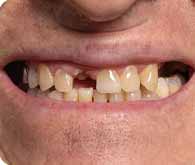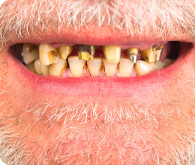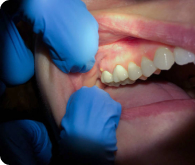
What are dentures?
Common types of dentures

Implant Supported Over Dentures
Fixed dentures, also known as implant-supported dentures or fixed bridges, are a type of dental restoration that offers a permanent solution for missing teeth. These dentures are securely anchored to dental implants surgically placed in the jawbone. The implants act like artificial tooth roots and provide a strong foundation for the fixed dentures. The dentures are typically made of high-quality materials like porcelain, which closely resemble natural teeth in appearance and function.

Removable Partial Dentures :
Removable dentures, also known as complete or partial dentures, are designed in order to replace missing teeth and might be taken out for cleaning and maintenance. They are typically made from acrylic or a combination of acrylic and metal. Removable dentures rely on the gums and remaining natural teeth (in partial dentures) for support and stability
Signs that indicate you need dentures

Severe Tooth Decay :
Extensive and irreversible tooth decay that cannot be effectively treated with fillings or crowns.

Gum Disease (Periodontitis) :
Advanced periodontitis is a severe gum disease that can cause extensive damage to the supporting structures of the teeth.

Tooth Mobility :
Teeth that are loose and moving due to loss of bone support.

Multiple Missing Teeth :
Loss of several teeth, especially if they are unsuitable for individual replacements like dental implants.

Difficulty or Pain While Chewing :
Inability to effectively chew food or experience pain due to missing or damaged teeth.

Chronic Oral Infections :
Frequent oral infections despite attempts at treatment, indicating compromised dental health.

Significant Tooth Wear :
Excessive wear of tooth surfaces, which may result from grinding, clenching, or erosion, making restoration with dentures necessary.

Jaw Pain or TMJ Issues :
Persistent jaw pain or temporomandibular joint (TMJ) dysfunction may be related to dental problems requiring dentures.

Speech Difficulties :
Pronunciation or slurred speech caused by missing teeth affects speech patterns.

Deterioration of Facial Structure :
Loss of facial support and a sunken appearance due to missing teeth, indicating the need for dentures to restore facial aesthetics.


Improved Appearance
Restored Functionality
Dentures enable individuals to chew, bite, and speak more effectively, restoring proper speech and eating capabilities.
Enhanced Confidence
By providing a natural-looking smile, dentures boost self-esteem and confidence, allowing individuals to socialize and smile without hesitation.
Aid in Digestion
Properly fitting dentures aid in chewing food thoroughly, supporting better digestion and overall dietary habits.

